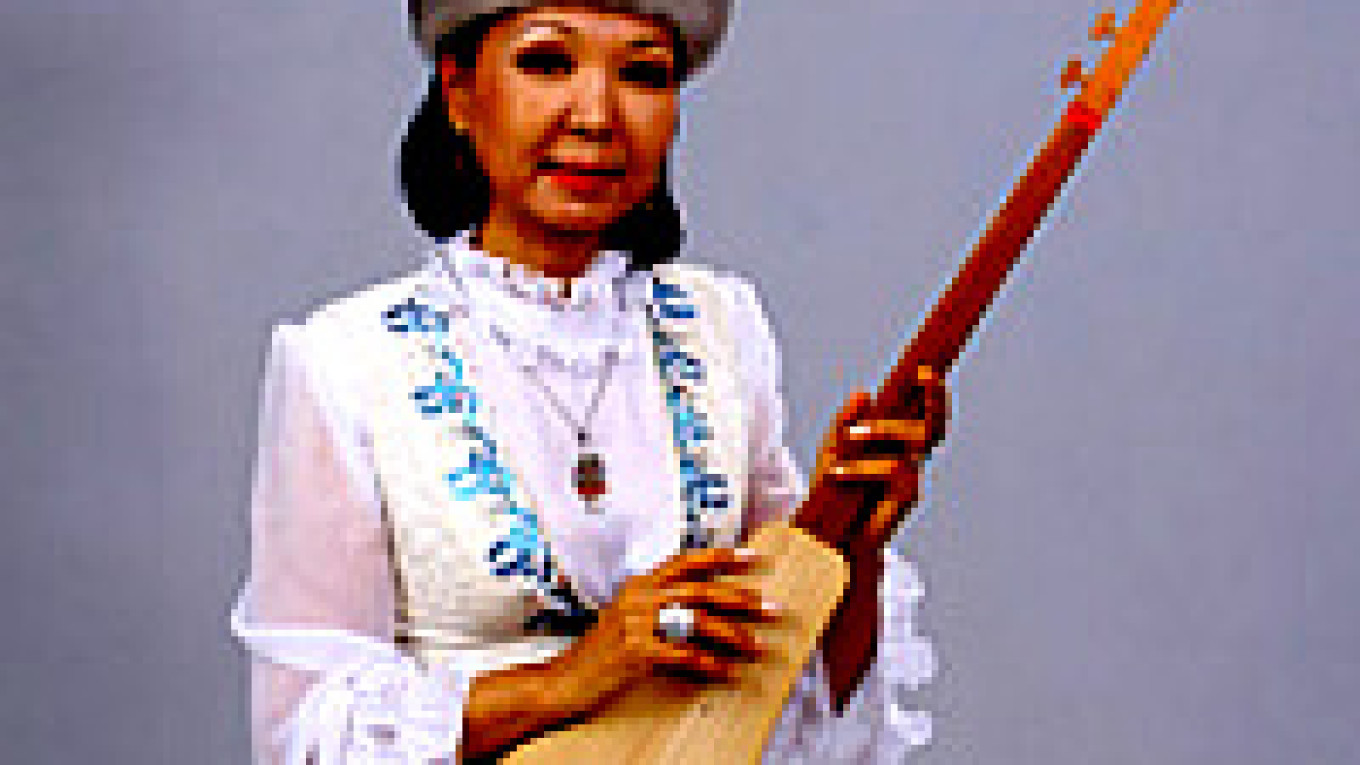The festival, a mix of art and music, aims to bring cultures closer to each other and will finish with a performance by one of Tajikistan's most famous singers, Dawlatmand Kholov, with the music he brought down from the mountains and has sung around the world -- former French President Jacques Chirac is said to be a fan.
Kholov comes from the southern Tajik city of Kulyab, a small city in a green mountain valley closer to the arid border of Afghanistan than to the relative bustle of Dushanbe.
It was through Afghanistan that Sufism, a mystical form of Islam, reached his high mountain valley.
The group plays the traditional instruments of their mountainous region in a song form known as falak, which translates as "vault of the sky" or "destiny." Falak songs usually talk of separation or despair and are often addressed to the sky.

Rozamira
Kholov and his sons will play falak, traditional Tajik music from the south.
| |
Kholov, who leads his five sons in the ensemble as well as 10 other musicians, is also one of the leading musicians inspired by Sufism.
"It is hard not to feel the depth of the Sufi traditions and ... the deep philosophical mysticism of the music," said Yaroslava Ziva-Chernova, a spokeswoman for Rozamira. "This is very traditional Tajik music."
Besides the well-known sitar, the group plays more exotic instruments such as the konun -- an ancient stringed instrument -- the rubab, the labchang, the saz -- a lute-like instrument -- as well as the khidzhak, an instrument typical of Tajikistan that resembles a violin.
In short, the instruments are as diverse as the dialects of Farsi found in the high mountain valleys of the Pamirs.
The ensemble also plays the daf, a goat-skin frame drum that is usually only played during Sufi religious rituals.
Many of the songs Kholov plays are inspired by Rumi, a 13th-century Sufi mystic poet from Persia.
The poetry of Rumi, who is claimed as a national poet in Tajikistan as well as Turkey, Iran, Pakistan, Bangladesh and India, bridged the gap between the spirituality of Sufi Islam and the imperfection of the real world.

Rozamira
Namgar will play together with 4:33.
| |
"Dawlatmand Kholov is a symbolic figure representing an integral part of a culture and a unique form of music, falak. He uses this form to convey the poetic and Sufi principles embedded in their daily life," writes Jami.
The first performer in the festival will be Salamat Sadykova, once a popular Soviet artist and today an ambassador of Kyrgyz music around the world. Sadykova learned to play the komuz, a traditional Central Asian instrument similar to a lute, at a young age. Raised by her grandmother, a singer of the traditional koshok, or funeral dirge, Sadykova began singing early and had great success at making traditional Kyrgyz music accessible.
Also playing at Rozamira will be the band 4:33, who will play alongside the group Namgar fusing the sounds of Mongolia and southern Siberian nomads with modern electronica.
4:33 and Namgar play Nov. 13 at 7 p.m. at the Moskovskii Mezhdunarodnyi Dom Muskyki, Kosmodamianskaya Nab. 52. M. Paveletskaya. Tickets can be purchased at 730-1011. The Davlatmand Ensemble will play Nov. 16 at 8 p.m. at the DOM Culture Center, Bol. Ovchinnikovskii Per., 24/4. M. Novokuznetskaya. Tickets can be ordered at 953-72-36 or 953-72-42. Questions can be sent to dom@dom.com.ru. Sadykova will play Nov. 15 at 8 p.m., also at Dom.
A Message from The Moscow Times:
Dear readers,
We are facing unprecedented challenges. Russia's Prosecutor General's Office has designated The Moscow Times as an "undesirable" organization, criminalizing our work and putting our staff at risk of prosecution. This follows our earlier unjust labeling as a "foreign agent."
These actions are direct attempts to silence independent journalism in Russia. The authorities claim our work "discredits the decisions of the Russian leadership." We see things differently: we strive to provide accurate, unbiased reporting on Russia.
We, the journalists of The Moscow Times, refuse to be silenced. But to continue our work, we need your help.
Your support, no matter how small, makes a world of difference. If you can, please support us monthly starting from just $2. It's quick to set up, and every contribution makes a significant impact.
By supporting The Moscow Times, you're defending open, independent journalism in the face of repression. Thank you for standing with us.
Remind me later.


